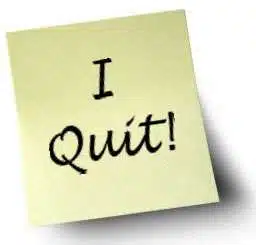Of all the stratagems, to know when to quit is the best. – Chinese Proverb

I am not proud of it, but I am a quitter.
I have always put my all into everything I do, and it’s a characteristic that I am really proud of.
If I have committed to something, I do everything in my power to stick it out until the end.
This is the message that I share with people as encouragement when they’re struggling with an issue. I encourage them to stop thinking about how to quit and focus on how NOT to quit – to push through it and finish whatever it is.
The only thing that haunts me when I’m telling people not to be a quitter is that it’s not entirely true!
I know that there are things in life that I have quit; while most of them were minor, the one that lingers with me is my attempt at getting an MBA.
I enrolled in the MBA program at my university and after taking only one class I dropped out. It’s almost embarrassing to admit that, being that I consider myself to be successful!
For most of my collegiate career, I was a B to B+ student, but at the time of dropping the class, I had a D. In fact, it was probably closer to a D-.
I had just graduated college and began working as a junior broker at A.G. Edwards and Sons. Having enlisted in the National Guard for six years, I had up to four years’ worth of tuition paid for, compliments of the military. As it turns out, after getting my bachelor’s degree, I still had a year remaining, and my university, SIU Carbondale, had an MBA program that I could complete in a one-year time frame. It was too perfect to pass up!
Being overly ambitious, as I always am, I thought, what the heck? I can get my MBA and also start my job as a financial advisor. It’s a win-win!
Here’s the thing about my job – I had a very small salary. So small, in fact, that I was only making about $18,000 a year base. I think that’s the first time I’ve ever shared that publicly. It was peanuts. I could have made more work full-time working at my mall job, GNC (General Nutrition Center), hocking protein powders and vitamins. It was almost embarrassing. Then again, it was a job.
In addition to my measly base salary, I would also split commissions and fees 50/50 on new clients I brought in. Although that sounds attractive, you have to realize that I was in the wirehouse model (Wirehouses are the big investment firms like Merrill Lynch, Morgan Stanley, etc.). For every dollar I made the firm, they took $.60.
As an example, for every $1000 of commissions or fees I made, the remaining money after the firm took their share was only $400. Then from that $400 I would split 50/50 with the advisor who hired me. So now I’m down to a whopping $200. Then you figure out medical insurance, taxes, 401(k)……yeah, I was left with next to nothing.
Since I was only making a small base salary, it was on me to find new clients if I wanted to succeed financially. I had just graduated, was in my early 20s, and had a very small network of people. My family didn’t have money and my friends didn’t have money, so I had to look to strangers to do business with me.
I did cold calling all day, and two to three nights per week. I held seminars. I set up booths at trade shows. I taught investment classes. I did anything and everything! While most people only work 40 hours a week, I was easily spending 70 hours or more trying to build up my client base.
In addition to working more than 70 hours a week, I was taking my first MBA class, which was some sort of marketing class. It was one day a week on Thursday night and lasted for three hours. In between each class, I had more homework and more reading assignments than any of my undergrad college classes. It was really quite horrible. I pretty much bombed the first test in my MBA class. This was the first time I realized that I had taken on too much.
Never Say Die?
Even knowing I had bit off more than I could chew. I was arrogant, I was confident, and I reassured myself that I could pull it off. I kept going, working 70 hours a week, studying ten to fifteen hours a week, and just doing everything I could to make it work.
After the second test for my MBA class, the situation did not improve. In fact, it was horrible. I remember taking that test and having no clue how to answer half the questions. On essay-style tests, I’m usually a good B.S.er – but my professor saw right through it. I don’t remember my exact grade, but I’m pretty sure it wasn’t a C or a B, and definitely not an A!
At that point in time, I needed to make a decision. I started asking myself,
It didn’t take that long to figure out that an MBA didn’t really do much for me as a financial advisor. After answering those hard questions and realizing that I needed to take care of myself at the moment, I made the tough decision to quit.
Even after I made the decision, I didn’t want to do it. I’d never quit anything that I started, especially in my adult life. I wasn’t proud to be a quitter, but my hunch was that if I stuck to it, not only would I fail at getting my MBA, but I could possibly fail at starting my business as a financial advisor.
So, as tough as it was, I pulled the plug. I quit.
It took less than 30 days to figure out that I made the right decision. In fact, I should have made the decision much earlier. As a way of solidifying me from dropping the MBA program, I sought to attain the certified financial planner designation. I’ve viewed that, in my mind, as the MBA of my profession.
Know When to Quit
If at first you don’t succeed, try, try again. Then quit. There’s no point in being a damn fool about it. – W.C. Fields Quote
If you’re ever in a situation where you feel like you’re a failure, and you just want to throw your hands up in frustration and walk away, you have to ask yourself those hard questions.
There are situations where you need to stick it out. But if you are in a situation where you feel stuck, start asking yourself the tough questions. You might discover the current situation you’re in is actually preventing you from exploring other opportunities where you could have much more rapid growth and see much higher potential revenue.
It’s a tough situation to be in. What helped me was talking to my peers, not only the advisor who had hired me, but to other people – some of my former college professors, my guidance counselor, and friends. It was helpful to get different perspectives of what they felt the best decision would be.
As you talk to people, listen to everything they share, take the information, and digest it, but then always make a decision to do what’s best for you. Just because you are a quitter today doesn’t mean you can’t be a winner tomorrow.
Have you ever quit something that was hard to do but later you were thankful you did?
Final Thoughts on How Being a Quitter and a Dropout Made Me More Successful
In life, knowing when to quit can be a vital skill. Sometimes, it’s crucial to reassess and make tough decisions for your well-being. Quitting doesn’t always equate to failure; it can open doors to more promising opportunities and personal growth. The key is to ask the right questions, seek advice, and choose the path that aligns with your goals and aspirations. Remember, being a quitter today doesn’t define your future success.








Thanks for the article Jeff.
I’m also a veteran who was able to earn my undergraduate degree without debt.
Afterwards I interned in the Project Management Office at a Fortune 100 company. Everyone had an MBA and I loved the work we were doing.
I just completed my first semester at a top 30 B-School in the U.S. where I earned 2 As, a C, and an F. I learned about interpreting financial statements, running supply chain models, and did a lot of networking.
They dismissed me because of the F. The program certainly required mountains more effort than a Bachelor’s degree.
I’m still a little bummed, but I can always pursue a PMP (Project Management Professional) certification. It carries less weight than an MBA, but it may allow me to travel in the same circles I’ve become accustomed to. I feel the material is more relevant for my work as a PM as well.
I don’t know what to say. It’s not for everyone. I do know that I won’t need to interpret financial statements or enhance any supply chain models anytime soon in my current role. Is $18k a lot to pay for a stacked linkedin account?
#mbadropouts
#mbashrug
Good post about an important issue. Another way to look at it is prioritizing what is important at any given time. With limited resources, how do we make the most of them? I found the following post from the Harvard Business Review blog helpful when I faced similar issues.
http://blogs.hbr.org/schwartz/2012/06/the-art-of-letting-go.html
I can completely agree with your situation and decision. Being in recruiting, which is also a commission business where you work demanding hours, I’m facing the same questions in my first MBA semester…
@ Jenni It’s a tough call. I really felt like I was giving up when I dropped out. 10 years later I can definitely say it was the best decision.
Some people are just not cut out for school. Specially if you can’t figure out where different subjects would be good for. If you are looking at analyst positions that MBA will help a lot.
I loved this story Jeff. Your experience is exactly like my first attempt at a masters degree. I did the same thing and enrolled in a masters program immediately after finishing my bachelors. Same thing, took the first exam and got a D.
After that first test, I could stomach the thought of another multiple choice exam where I crammed the evening before to memorize a bunch of stuff only to forget it immediately after the exam.
I finally did go back several years later and get an MBA, but in hindsight, it wasn’t worth it. I’m glad I did it, but unless you are entering a job that requires it (investment banking) as a ticket in the door, then the skills you learn are close to worthless.
Not a single one of my teachers had ever owned a business. Few of them had ever had a job outside of a college. Almost everything covered in the classes were theories from a text book that don’t work in the real world. As you know, it is marketing, sales, and satisfying customers that matters in a small business. A SWOT analysis just doesn’t cut it and neither does using advanced calculus to draw supply and demand curves.
What it really comes down to in the end, in my opinion, is ego. It seems cool having three letters after your name before you have them. But after you earn them you realize those three letters don’t mean a whole lot in the real world where you live and die by the bottom line. You still have go out and learn the things that really matter–which are totally different than those required to get a degree.
Anyone ever haunted by not completing formal education, I highly recommend the book The Education of Millionaires. I’ve been on both sides of it now, and Michael nails it in that book.
Great article Jeff! I agree with you that knowing when to quit something is a very important lesson that is very hard to learn especially for over achievers. I’m glad you came to that realization before it was too late and it damaged your career as a financial advisor!
Great confirmation story! Thank you for sharing.
You’re welcome, Tammy. I’m glad you enjoyed it.